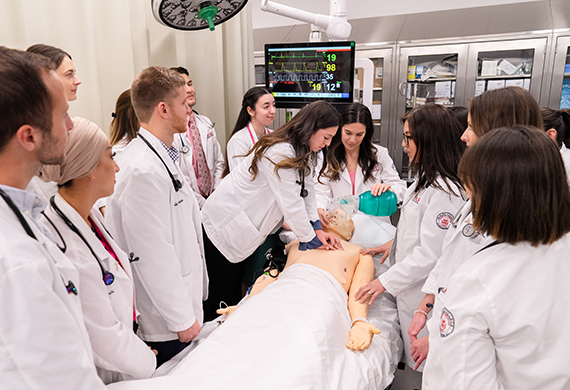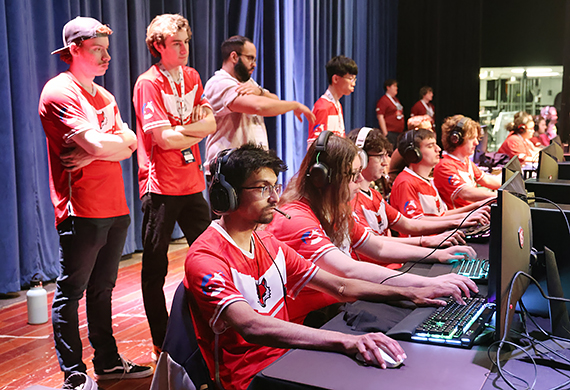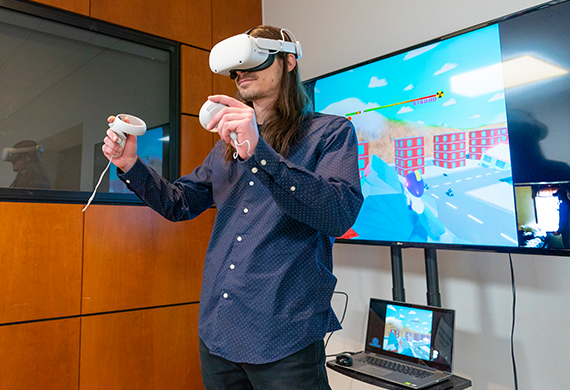A Life Less Ordinary: Violinist Robert Gupta '05 Releases His First CD
Is there such a thing as a typical day in the life of Robert Gupta ’05? Here’s a guy, after all, who completed his undergraduate studies in biology at age 18 at Marist, finished a master’s of music program at Yale University at 19, and became the youngest member of the Los Angeles Philharmonic just shy of his 20th birthday. If the story ended there, that would be remarkable enough.
But that would underestimate Robert Gupta.
Now 25 and still the youngest member of the Philharmonic, Gupta recently recorded his debut album, Suryodaya, a self-described “musical journey from India to Los Angeles,” on a 1716 Stradivarius belonging to a patron in the City of Angels. Recorded at Walt Disney Concert Hall in July and financed entirely through gifts from the online funding platform Kickstarter, all proceeds from the CD will go toward Gupta’s other passion project: the Street Symphony program.
Street Symphony grew out of a relationship Gupta developed with Nathaniel Ayers, the Juilliard-educated musician and homeless schizophrenic made famous by Jamie Foxx’s portrayal in the 2009 film The Soloist. The two met in 2008, at a birthday party for Ayers at a bowling alley in Glendale, Calif. “He started asking me questions about this really difficult passage at the end of a Beethoven symphony, and I didn’t know how to describe it,” Gupta recalls. “And I had my violin with me, so I pulled it out and started playing it.”
A couple of weeks later, Gupta got an e-mail from Los Angeles Times columnist Steve Lopez saying that Ayers wanted violin lessons. During their first lesson, “Nathaniel had a complete manic episode. His eyes went completely bloodshot. I really saw a very disturbing manifestation of mental illness right in front of me. And what was striking was the fact that it was happening with a violin in his hands.” As he found his composure, Ayers started throwing out requests. “I related to this guy,” Gupta says. “But that’s one face of 50,000 homeless people in L.A. What do you do? It became a catalyst for me to not turn a blind eye toward homelessness anymore.”
With his background in neuroscience, Gupta has always been intrigued by the healing possibilities of music. “Is there a role for music in mental illness?” he asks. Street Symphony became that vehicle to explore the connection. Since its inception, Gupta and his fellow musicians (not only from the Philharmonic, but also students from the Colburn School and University of Southern California) have played for audiences ranging from homeless patrons of the Midnight Mission on Skid Row to veterans at a center in Long Beach and nonviolent offenders at four different L.A. County jails. By his own count, Gupta has played a total of 47 events in the last 16 months.
“We try to bring music to the most deeply underserved, mentally ill individuals who are dealing with homelessness and incarceration,” says Gupta, who curated an event called TEDxSkidRow in June with the help of friends he made through TED (a community of individuals from the worlds of technology, entertainment, and design). “But we also want to start reaching out to veterans with PTSD, or with massive brain trauma, as well as hospices and hospitals—any place where this music would have a role in healing.”
If Street Symphony represents one passion project of Gupta’s, the other has been his first album—a globe-spanning collection that reflects his culture and his influences. “Indian classical music is the first music I ever heard, and it’s music that was part of my family and my culture and my childhood,” he explains. “But I’d never played it before.”
In the same exhaustive fashion typical of his other ventures, Gupta listened to “probably every recording on iTunes and watched every video on YouTube” to learn ins and outs of writing Indian classical. Suryodaya (now available on iTunes and Amazon) opens with “Jaunpuri,” an Indian classical raga that he composed by hand, then segues from Persian music to European music spanning the medieval, baroque, and romantic periods, fast-forwarding to American music (closing with an original composition by Philharmonic timpanist Joe Pereira).
“I’m very happy that I will reach an audience wider than the classical audience alone,” says Gupta. “Suryodaya means ‘sunrise’ in Sanskrit, but it also means a kind of gift of light.” In talking to audiences about Street Symphony, he frequently quotes 19th-century German romantic composer Robert Schumann, who also suffered from schizophrenia. “He said, ‘To send light into the darkness of men’s hearts—such is the duty of the artist.’ And I feel like it’s a beautiful way of making a parallel between the light of music and what we do for Street Symphony.”
The Stradivarius he plays on the album belongs to businessman and philanthropist Jerry Kohl. It was played for many years by Nathan Milstein (1904-1992), who to Gupta was “the ultimate violinist. He had this 60-year career churning out perfect, deeply honest music.” The first time Gupta played on the nearly 300-year-old violin, “I felt like a puppy on Ritalin. My mind was going to explode. Playing on that Strad was just a dream.”
As Robert and his younger brother, Patrick ’08 (who is now finishing up a PhD in chemistry at RPI), thrive in their post-Marist careers, their mother is now following in their footsteps. Chandana Gupta enrolled at Marist this fall after a couple of years of coursework at Orange County Community College. “I’m thrilled and so proud of her,” says Robert of his mother, whose undergraduate studies at Queens College were interrupted by his birth in 1987. “She’s an incredibly hard worker—she’s staying up very late—but she wants to get the most out of Marist that she can, and I think she will. She certainly knows the campus very well.”



